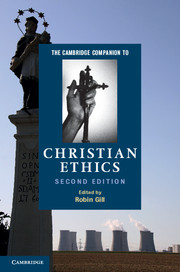Book contents
- Frontmatter
- Part I The grounds of Christian ethics
- Part II Approaches to Christian ethics
- Part III Issues in Christian ethics
- 13 Christianity and war
- 14 The arms trade and Christian ethics
- 15 Social justice and welfare
- 16 Ecology and Christian ethics
- 17 Business, economics and Christian ethics
- 18 World family trends
- 19 Sexuality and religious ethics
- 20 Christian ethics, medicine and genetics
- Select bibliography
- Index
18 - World family trends
from Part III - Issues in Christian ethics
Published online by Cambridge University Press: 28 January 2012
- Frontmatter
- Part I The grounds of Christian ethics
- Part II Approaches to Christian ethics
- Part III Issues in Christian ethics
- 13 Christianity and war
- 14 The arms trade and Christian ethics
- 15 Social justice and welfare
- 16 Ecology and Christian ethics
- 17 Business, economics and Christian ethics
- 18 World family trends
- 19 Sexuality and religious ethics
- 20 Christian ethics, medicine and genetics
- Select bibliography
- Index
Summary
Family changes engulfing advanced western societies over the last four decades – divorce, out-of-wedlock births, father absence, etc. – were first interpreted by social scientists as benign. The sociologist Talcott Parsons said in the 1950s that families were changing but still fulfilling their functions. The feminist sociologist Jessie Bernard said in her influential The Future of Marriage (1972) that these changes were not dangerous; that they were not harming children; that marriage was not particularly good for women anyway; and that divorce, cohabitation and non-marital births would contribute to the increased freedom of women. Some social scientists held that family changes were harmful only when they ended in poverty. A wider welfare net and a healthy economy, they argued, could prevent these negative consequences.
Since the late 1980s, there has been a worldwide change in the attitudes within the social sciences toward these family changes. Sociologists, psychologists and economists today are much more willing to acknowledge that they have been damaging to large numbers of people. The family changes have contributed to the declining well-being of children, the ‘feminisation of poverty’ (the shift of poverty from the elderly to single mothers and their children) and the ‘feminisation of kinship’ (the trend toward women alone sustaining families without the help of fathers and husbands). Although most social scientists now concur that these changes have been costly to individuals and society, they disagree over whether they can be reversed or must simply be accepted with the hope of mitigating their negative consequences.
- Type
- Chapter
- Information
- The Cambridge Companion to Christian Ethics , pp. 257 - 270Publisher: Cambridge University PressPrint publication year: 2011

